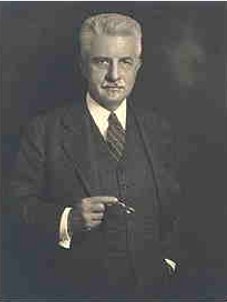Arthur Lovejoy was a “historian of ideas” (in fact, he founded the
discipline) who wrote several books considered seminal. “The Great Chain of
Being” is his most well-known work. It's a somewhat peculiar study of the
development of certain philosophical ideas derived from Plato and Plotinus.
Lovejoy uses the expression “Great Chain of Being” to denote a Platonist view
of the world as a strictly rational order emanated by a God identical to the
Idea of the Good. The principle of “plenitude” dictates that every potential
creature must be actualized. Therefore we get a long “chain” of creatures, from
the smallest worms (or microbes, when these were discovered) to the most
powerful angels. Since God is The Good and his handiwork is strictly rational,
the world as we know it is the best possible world. From this follows the idea
that evil is a necessary part of the whole, and cannot be dispensed with.
Lovejoy's traces the development of this idea (he calls it “a series of footnotes to Plato”, with a nod to Whitehead) during the Middle Ages and Early Modern Period, stopping at the Romantics circa 1800. Tracing the evolution of a single idea is difficult, and the author often digresses into discussions about other aspects of philosophy, or the history of science. I didn't know Leibniz (17th century) speculated about the old age of the Earth and biological evolution! Nor did I know that Locke believed in essences. I *did* know that medieval man didn't consider the central position of the Earth to be privileged. (C S Lewis must have borrowed from Lovejoy's work for his own “The Discarded Image”.)
Lovejoy describes how the Great Chain of Being was “temporalized” during the Enlightenment, being turned from a static concept to a more evolutionary perspective, where the chain was seen as a ladder, with many possibilities yet untested. (Both these versions of the “chain” are still with us in the religious-spiritual milieux, the Traditionalists insisting on the static version, while the Theosophists and their many off-shots support the latter perspective.) Eventually, the whole chain began to unravel, as philosophers and scientists realized that the fossils were remains of extinct creatures. Perhaps the world wasn't strictly rational, after all? Had Lovejoy followed the story through the 19th century, he could have pointed out that the progressive-evolutionary perspective was rather seamlessly combined with the extinction perspective, since (of course) the extinctions could be seen as necessary evils á la Plotinus in a cosmos forever evolving forward (a 20th century example rather late in the game would be Teilhard).
The author spends much time analyzing the real or perceived contradictions in Platonism. This can occasionally be somewhat annoying, as when Lovejoy claims that Plato and Plotinus really believed in two gods: the self-sufficient and aloof “One”, and the overflowing, ever-active god of emanations, often personalized as a craftsman or demiurge (a bit like the Biblical creator-god). Lovejoy gravely tells us that these two gods are logically incompatible. Perhaps they are, but Lovejoy also admits that Plato was a mystic who often used allegory when words failed him. What if the “two gods” (they would be three in Christianity!) are an attempt to communicate a mystical insight?
I'm not sure who might be interested in this work, which is rather hard to read and somewhat narrow. I read some chapters, and skimmed others. My edition also comes with a very strange introduction by Peter Stanlis, who exposits on the influence of Lovejoy's book on the poet Robert Frost! As a sidepoint, Integral Theory writer Ken Wilber highly recommends “The Great Chain of Being” (his idea of Plato as a “Descender” is inspired by it), so a future edition with a blurb by Mr Wilber might boost the sales… I doubt the average Integralist would find it useful, however! Arthur O Lovejoy's book is probably best suited for theology students, since it contains material pertinent to the question of “panentheism” (pan-en-theism).

No comments:
Post a Comment